Settlement Experiences of Refugee and Migrant Youth
Project Overview
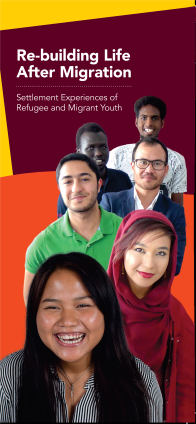
We are currently conducting an in-depth investigation of the diverse contextual factors impacting the settlement experiences of refugee and migrant background young people, 15-24 years, in Australia, Canada, and USA. We are also exploring the role of mental health and other support services in facilitating successful settlement. Conducted across three countries and involving 1200 surveys and 54 focus groups, this mixed-methods study is one of the most comprehensive research studies of refugee and migrant youth settlement in the world.
Project Background
Internationally, there is an urgent need to understand the factors promoting successful settlement of migrant and refugee background young people. In Australia almost 30 percent of the population is born overseas and almost 50 percent, has at least one parent born overseas. Therefore, it is vital that we create a socially inclusive and productive society that strives to support all its members and enables equitable participation in social institutions such as mental healthcare, education and employment.
This study investigates the settlement experiences and contextual factors impacting successful settlement of migrant and refugee background young people. The study outcomes will provide the settlement sector and service providers with crucial new knowledge on how to improve the wellbeing and settlement experiences of these young people in Australia, Canada, and the USA, with a view to influencing settlement and multicultural mental health policy and practice.
Research outcomes will enable a comparison of the mental health of refugee and migrant background young people in Australia, as well as a comparison between the mental health of young people across the three countries and elsewhere. This is needed as a matter of priority for settlement policy and intervention. The research provides a unique opportunity to address this need by bringing together a team of internationally recognised experts in immigration, settlement, acculturation and multicultural mental health, multicultural service delivery, behavioural and cultural economy, and epidemiology, with key industry partners from the national and international multicultural services sector.
Project Aims:
- To conduct an in-depth investigation of the experiences of refugee and migrant youth and the diverse contexts of migration to inform knowledge and evidence to improve their settlement and psychological wellbeing.
- To identify contextual factors that youth and their families identify as relevant for settlement and psychological wellbeing of youth, and to examine the relationships between successful settlement and wellbeing.
- To investigate the nature, scope and effectiveness of support services currently accessed by youth and their families.
- To provide recommendations for effective research communication and dissemination strategies to impact policymakers and service providers across the mental health and social services sector, and position future research in the field of settlement.
Project Update:
The research project began in September 2020 with data collection starting one year later. After a massive recruitment drive and with the invaluable assistance from Industry Partners in Australia, Canada and the USA, 1200 surveys have now been completed as well as 53/54 focus groups. This is a massive achievement considering the challenges encountered during a Covid-19 era which mandated social distancing, work stoppages and lockdowns, at various times across project sites. We expect to complete data collection by end September 2023.
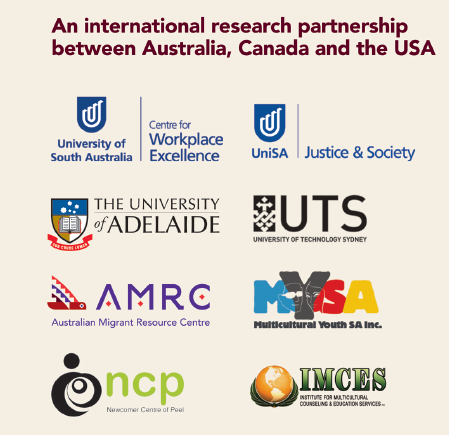
Chief Investigators (CI):
- Prof. Tahereh Ziaian, University of South Australia
- Prof. Martha Augoustinos, University of Adelaide & University of South Australia
- Prof. Adrian Esterman, University of South Australia
- Prof. Michelle Baddeley, University of Technology Sydney
- Prof. Nancy Arthur, University of South Australia
- Dr. Helena de Anstiss, University of South Australia
Partner Investigators, and Partner Organisations
- Ms. Mirsia Bunjaku & Eugenia Tsoulis, OAM – Australian Migrant Resource Centre (AMRC).
- Ms. Tamara Stewart-Jones – Multicultural Youth South Australia (MYSA).
- Ms. Effat Ghassemi, Newcomers Center of Peel (NCP), Canada.
- Dr. Tara Pir, Institute of Multicultural Counseling & Education Services (IMCES), USA.
Researchers
- Dr. Teresa Puvimanasinghe, Postdoctoral Research Fellow
- Dr. Emily Miller, Research Associate
- Ms. Ethel Osazuwa, PhD Candidate
- Ms. Doukessa Lerias, PhD Candidate
Project Advisory Committee
From academia
- Prof. Alison Phipps - University of Glasgow, UNESCO Chair in Refugee Integration, expertise in refugee resettlement.
- Prof. Saba Safdar - University of Guelph, Canada, Director, Centre for Cross-Cultural Research, expertise in cross-cultural mental health.
- Dr. Uwe Gielen - Emeritus Professor of Psychology, Executive Director, Institute for International and Cross-Cultural Psychology, USA.
- Prof. Samson Tse - University of Hong Kong; expertise in cross-cultural mental health.
- Prof. Rena Papadopoulos - Middlesex University, London, expertise in transcultural health
- Prof. Jolanda Jetten - University of Queensland, expertise in social psychology, cultural identity, and intercultural relations.
- Prof. Susan Rees - University of New South Wales (UNSW), Australia, expertise in refugee mental health, gender, human rights, and gender-based violence.
From the community
- Ms. Sandra Elhelw Wright - Head, Settlement Council of Australia (SCoA), qualified lawyer, expertise in domestic and family violence.
- Mr. Arman Abrahimzadeh - Zahra Foundation, Australia, providing economic empowerment for women fleeing abusive homes, Councillor, City of Adelaide.
- Mr. Adam Beik - President, Training & Employment Advisory Council, South Australia (TEACSA).
This 4-year research study (2020-2024) is funded by the Australian Research Council (ARC) Linkage Scheme, LP190100740
Project Publication
- Ziaian T., Puvimanasinghe T., Miller E., Augoustinos M., Esterman A., Baddeley M., Arthur, N., de Anstiss, H., Tsoulis, E., Stewart-Jones, T., Ghassemi, E., & Pir, T. (2023) Rebuilding life after migration: Research protocol of a mixed methods study on settlement experiences of refugee and migrant youth. PLoS ONE 18(4): e0285023.
https://doi.org/10.1371/journal.pone.0285023 | Journal Impact Factor: 3.752 | Q1
Recent Conference Presentations
- Exploring the path to successful settlement: Principles and insights from an international study | Presenter: Tahereh Ziaian | Co-authors: Martha Augoustinos, Adrian Esterman, Michelle Baddeley, Nancy Arthur, Helena de Anstiss, Eugenia Tsoulis, Tamara Stewart-Jones, Effat Ghassemi, Tara Pir , Mirsia Bunjaku, Teresa Puvimanasinghe, Emily Miller, Ethel Osazuwa, Doukessa Lerias | International Association for Cross-Cultural Psychology (IACCP) Conference, Limerick, Ireland, August 1-4, 2023
- Education, aspiration, and acculturation: Rebuilding life after migration | Presenter: Emily Miller | Co-authors: Tahereh Ziaian, Martha Augoustinos, Adrian Esterman, Michelle Baddeley, Nancy Arthur, Helena de Anstiss, Eugenia Tsoulis, Tamara Stewart-Jones, Effat Ghassemi, Tara Pir, Mirsia Bunjaku, Teresa Puvimanasinghe, Ethel Osazuwa, & Doukessa Lerias | International Association for Cross-Cultural Psychology (IACCP) Conference, Limerick, Ireland, August 1-4, 2023.
- Parental Social Determinants Underpinning the Psychological Wellbeing of Refugee-Background Youth in Australia, Canada, and the United States | Presenter: Ethel Osazuwa | Co-authors: Tahereh Ziaian, Martha Augoustinos, Adrian Esterman, Teresa Puvimanasinghe, Eugenia Tsoulis, Tamara Stewart-Jones, Effat Ghassemi, and Tara Pir | International Association for Cross-Cultural Psychology (IACCP) Conference, Limerick, Ireland, August 1-4, 2023.
- Addressing the role of acculturative stress on the mental health of immigrant youth: Implications for practice | Presenter: Doukessa Lerias | Co-Authors: Tahereh Ziaian, Emily Miller, Nancy Arthur, Martha Augoustinos, Tara Pir | ANZ MHA 24thInternational Mental Health Conference, Gold Coast, June 7-9, 2023.
- Effective and inclusive service provision for refugee and migrant communities: Findings from research (part of symposium) | Presenter: Emily Miller | Co-authors Tahereh Ziaian & Teresa Puvimanasinghe | The Mental Health Services Conference: Bringing humanity and human rights into mental health, Adelaide, August 15-18, 2023.
Associated publications
- Ziaian, T., Miller, E., Puvimanasinghe, T., Esterman, A., Dollard, M. F., & de Anstiss, H. (2023). Family Functioning and the Psychological Wellbeing of Refugee-Background Youth in Australia. Journal of Immigrant & Refugee Studies. https://doi.org/10.1080/15562948.2023.2238264
- Ziaian, T., Puvimanasinghe, T., Miller, E., de Anstiss, H., Esterman, A., Dollard, M. F. (2021) Identify and belonging: refugee youth and their parents' perception of being Australian. Australian Psychologist,56 (2), 123-136. https://doi.org/10.1080/00050067.2021.1893601
- Ziaian, T., Puvimanasinghe, T., Miller, E., de Anstiss, H., Esterman, A., Dollard, M. F. & Afsharian, A. (2021). Family influence on refugee youth education and employment aspirations. Journal of Family Studies, 1-19. https://doi.org/10.1080/13229400.2021.1879898
- Afsharian, A, Dollard, M, Miller, E, Puvimanasinghe, T, Esterman, A, De Anstiss, H & Ziaian, T 2021, ‘Refugees at work: The preventative role of psychosocial safety climate against workplace harassment, discrimination and psychological distress’, International Journal of Environmental Research and Public Health, vol. 18, no. 20, p. 10696. https://doi.org/10.3390/ijerph182010696
- Ziaian, T., Barrie, H., Puvimanasinghe, T., Miller, E., Dollard, M., Esterman, A., Barrie, H., Afsharian, A. (2019). Demographic profile of SA refugee youth population: Pathways to active citizenship: refugee youth and their transition from school to further education, training, and employment . Adelaide, Australia: University of South Australia.DOI: https://doi.org/10.25954/5c90261b25e47 ISBN: 978-0-646-80424-8
- Ziaian T, Miller E, de Anstiss H, Puvimanasinghe T, Dollard M, Esterman A, Barrie H, Stewart-Jones T, (2019). Refugee youth and their transition from school to further education, training, and employment in Australia. JMIR Res Protoc., PMID: 31368445
- Ziaian, T., Puvimanasinghe, T., Miller, E., de Anstiss, H., Dollard, M. F., Esterman, A., Barrie, H., & Afsharian, A. (2018). Challenges, facilitators, and enablers of conducting research with youth from refugee backgrounds. The Australian Community Psychologist, 29(2).
- Miller, E., Ziaian, T., & Esterman, A. (2018). Australian school practices and the education experiences of students with a refugee background: A review of the literature. International Journal of Inclusive Education, 22(4), 339-359. https://doi.org/10.1080/13603116.2017.1365955
- Ziaian, T, de Anstiss, H, Antoniou, G, Puvimanasinghe, T., & Baghurst, P. (2016). Sociodemographic predictors of health-related quality of life and healthcare service utilisation among young refugees in South Australia. Open Journal of Psychiatry, vol. 6, no. 1, pp. 8-19. 4236/ojpsych.2016.61002
- Ziaian, T, de Anstiss, H, Antoniou, G, Baghurst, P & Sawyer, M. (2013). Emotional and behavioural problems among refugee children and adolescents living in South Australia. Australian Psychologist, vol. 48, no. 2, pp. 139-148. https://doi.org/10.1111/j.1742-9544.2011.00050.x
- Ziaian, T, de Anstiss, H, Antoniou, G, Sawyer, M & Baghurst, P. (2012). Depressive symptomatology and service utilisation among refugee children and adolescents living in South Australia. Child and Adolescent Mental Health, 17, no. 3, pp. 146-152. https://doi.org/10.1111/j.1475-3588.2011.00620.x
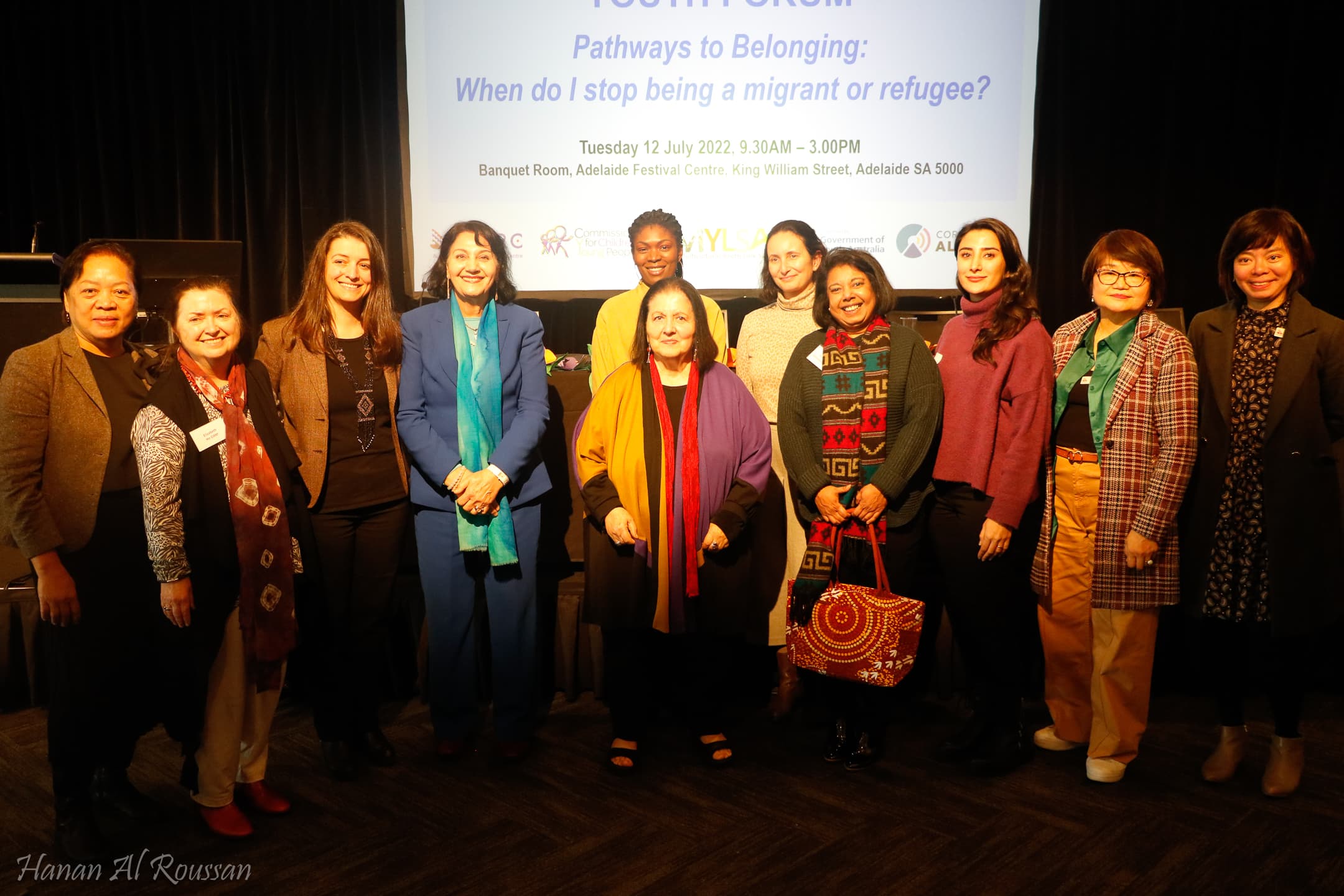
Prof. Tahereh Ziaian and her UniSA team with Australian industry partners from the Australian Migrant Resource Centre (AMRC).
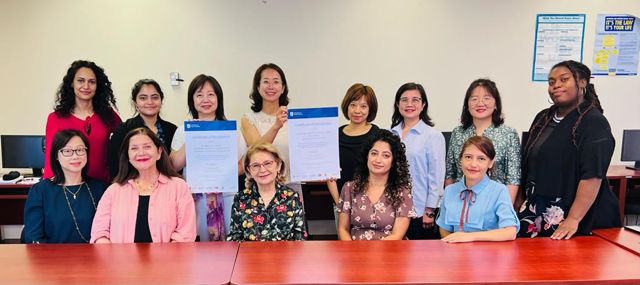
The Canadian industry partners from Newcomer Centre of Peel (NCP) with their Certificates of Recognition for an excellent job in completing data collection.
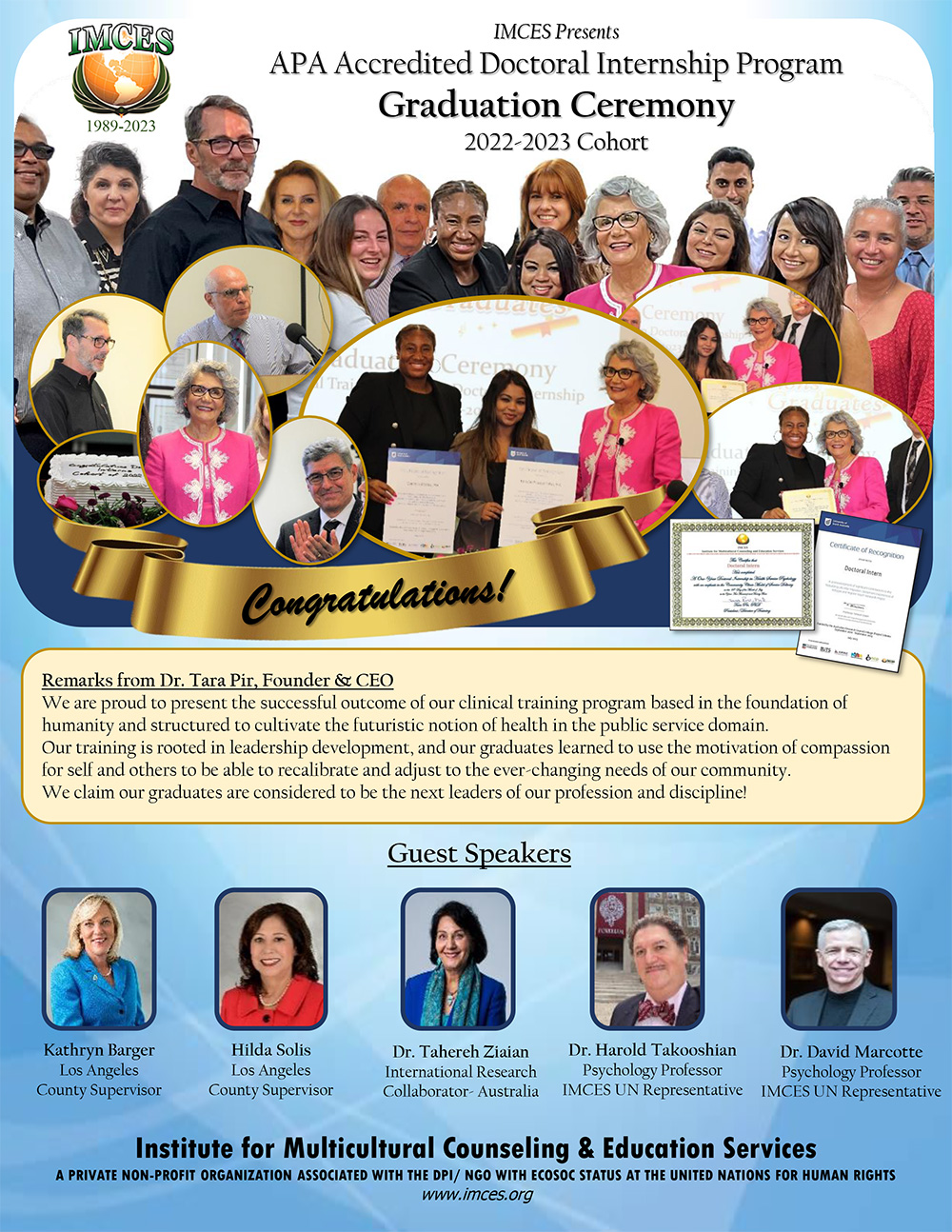
The USA Team from the Institute for Multicultural Counseling & Education Services (IMCES) at their Annual Graduation, 2022-23.


